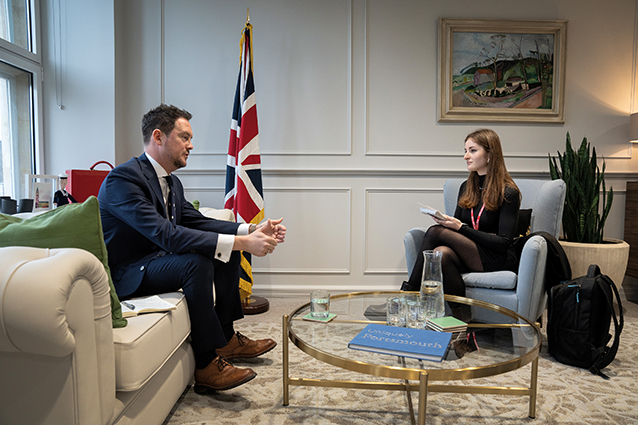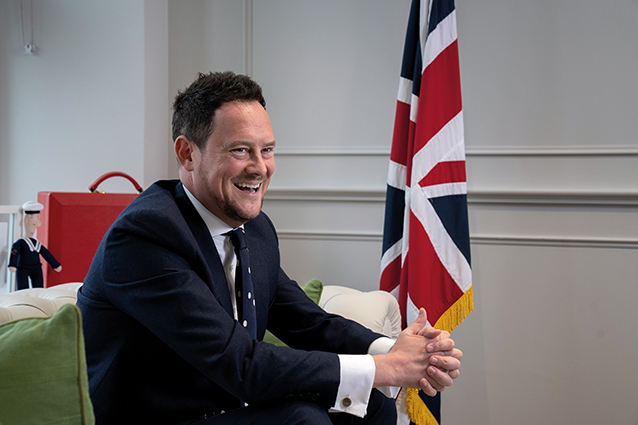Stephen Morgan: 'I’m really conscious that parents have had it pretty tough'
Stephen Morgan (Photography by Tom Pilston)
7 min read
The first-ever early education minister Stephen Morgan tells Matilda Martin what’s keeping him awake at night as he works to deliver a key election pledge
Stephen Morgan is the first-ever early education minister, a title minted to underline the new administration’s commitment to the start of children’s education.
The 43-year-old’s own journey from a working-class family to an office in the Department for Education – via a stint as a playworker – is still all too rare, he says.
“My frustration growing up in Portsmouth was that too often a child’s background did determine where they ended up in life,” he tells The House sitting in his office with views of Westminster Abbey.
I’m really conscious that parents have had it pretty tough
The room is littered with objects that testify to the fact that Morgan is ‘proper Pompey’: a knitted doll kitted out in a sailor suit, a cushion cover adorned with naval uniform, a coffee table book, Uniquely Portsmouth.
“I joined the Labour Party at the age of 16 when I was at school. I never thought I’d have this opportunity,” Morgan says.
“One of the best things about my job is getting out and about across the country, talking to young people and saying to them: ‘Aim high, work hard and you can achieve your dreams.’”
But, as the minister responsible for a pledge on behalf of Keir Starmer and Education Secretary Bridget Phillipson, Morgan is candid about the pressure he’s under – pressure that the Budget has increased.
“Keir and Bridget have set out that they want us to be a child-centred government. Early years is a real priority for Bridget, and I want to be a champion for early educators across government. I’m really conscious that parents have had it pretty tough, and to make life better for families is an absolute priority of mine.”
 Photography: Tom Pilston
Photography: Tom Pilston
The responsibility for delivering one of Labour’s key election pledges, the promise to offer 30 hours of free childcare by next September, falls firmly within his brief.
It will require an expanded workforce in a tight labour market at a time when the costs of employment are rising. “That’s what’s keeping me awake at night,” he says.
The expansion of free childcare provision was a promise introduced under the previous government, described by Labour as a “pledge without a plan” – a line Morgan repeats.
The pledge is to deliver on the expansion to 30 funded hours for eligible working parents with a child from nine months old up to school age from September 2025.
The minister admits there are challenges, particularly on the question of a diminished workforce, but insists he is “working that through with the sector, through roundtables, through individual stakeholder meetings, listening to what they’ve got to say in terms of their concerns, and seeing how I can work across government to address those”.
“We do need to be honest with people to say that we might not be able to give them their first choice. But it’s not stopping me from trying to do everything I possibly can to deliver on that.”
Morgan is clearly willing to listen, which is being received positively by the sector. Those who have worked with the minister describe him as personable and engaging.
But listening may not be enough to clear the obstacle that Rachel Reeves has placed in his way. Earlier this month, PoliticsHome revealed that the early years sector had written to the Chancellor about its concerns that the government’s wish for every family to be able to access affordable early education “will be nothing more than a pipe dream” if the sector is not supported with the National Insurance changes announced in the Budget.
Under the changes announced last month, National Insurance for employers will be increased by 1.2 per cent to 15 per cent from April 2025. The early years sector has warned that the rise, alongside an increase to the minimum wage, will impact not just on providers’ ability to deliver high-quality early education and care but on their overall viability.
Did the impact come out of the blue?
“I wouldn’t say so, no. Inevitably, with the Budget, you work through the detail and talk to the sector to understand what the kind of issues are.”
Many in the sector, however, have questioned why these conversations did not take place before the Budget was announced.
Faced with the recruitment challenge, Morgan says he is “particularly keen to see how we encourage more men to go and work in the sector as well”.
“But that challenge is significant, and that’s why the piece around valuing those that work in the sector and also finding ways to encourage more to go in via good recruitment campaigns is absolutely vital as well.”
He says one of the problems is that early years staff often “don’t feel valued for the work that they do”.
“Being a champion for what they do is absolutely one of my priorities, because if we can get it right in terms of the first 300 days of a child’s life, then it obviously does improve outcomes longer term for a child, and reduces some of those barriers that children can face as they go through the school system.”
Morgan admits that most of his weekends consist of reading submissions, broken up occasionally by a walk with his Labradoodle, traditionally named Albert.
Portsmouth-born Morgan attended a local comprehensive school and college before completing a degree at the University of Bristol, followed by a master’s in politics at Goldsmiths.
 Photography: Tom Pilston
Photography: Tom Pilston
He was elected in 2017 as MP for Portsmouth South and while in opposition held shadow ministerial roles in local government, defence and transport, as well as education.
Now in government, early years isn’t his only brief. He also has at least 12 other responsibilities, ranging from countering extremism in schools to the use of artificial intelligence in education.
Towards the end of the previous government’s tenure, the use of AI as a solution to workload was becoming more and more popular. Morgan says “we need to really think through the safety implications” – from both a pupil and teacher perspective.
He is keen to hear from all those involved, including parents. “It does have huge potential, but we want to make sure that there’s good regulation in place,” he says.
The ‘use of data, digital technology and AI in education’ brief is something that felt a “bit scary” to Morgan, who admits he is “not a techy person”.
He thinks the British public are in a similar place. “Coming into it quite cynical and seeing its potential and understanding the risks I think is probably the right place to be.”
And the role of technology in the riots following the Southport attacks in the summer has given the threat of extremism in schools a whole different angle – something leaders are growing increasingly concerned about.
Morgan says he wants to hear directly from school leaders on the challenges they face, adding that the “read-across around behaviour is also important”.
There is probably more we can do around misogyny in schools
“The online safety piece is important. There is probably more we can do around misogyny in schools, and I’m keen to talk to school leaders around what that might look like.”
There are other outside factors affecting schools that Morgan could help the sector with. The government recently announced plans to ban the sale of single-use vapes from June 2025, following concerns over their environmental impact, as well as the number of young people taking up the habit.
Does he expect schools to be given some kind of additional help and guidance to deal with the changes when they come in?
Morgan says this is something he would want to talk to his colleagues in health about, but he is also “keen to hear from teachers and school leaders on what they would want to see and be guided by them in what would be helpful for schools to have”.
Again, the minister shows he is willing to listen to the sector, following Phillipson’s example of “resetting the relationship”. And, so far, the early years sector is happy with Morgan’s response.
But, with the Budget’s impact yet to be realised, and workforce pressures bearing down on the sector, Morgan will need more than a relationship reset to deliver a key election pledge. His fortunes are now tied to how millions of parents will judge this government.
